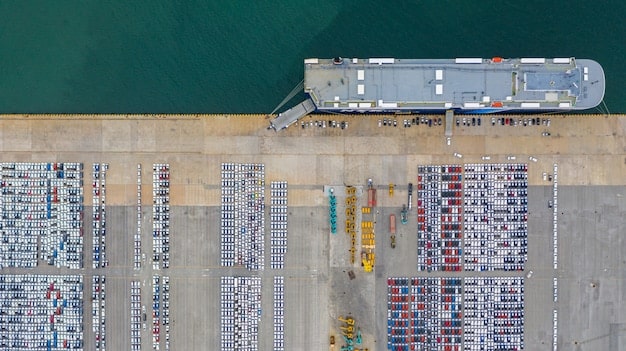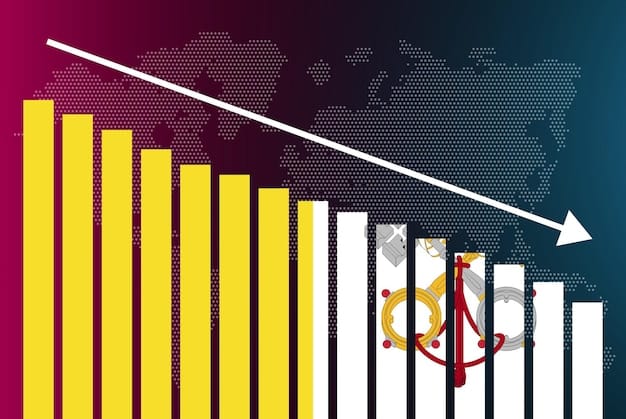US Sanctions Update: Analyzing Affected Countries & Economic Impact

US sanctions are economic tools used to influence the behavior of other nations, impacting various countries’ economies through trade restrictions, asset freezes, and financial penalties, with significant consequences for global commerce and political relations.
The US Sanctions Update: Which Countries Are Affected and What Are the Economic Consequences? is a complex and ever-evolving issue that significantly shapes global economics and international relations. Understanding the intricacies of these sanctions, their targets, and their repercussions is crucial in today’s interconnected world.
Understanding US Sanctions: An Overview
US sanctions serve as a key foreign policy instrument, employed to address national security threats, human rights violations, and other forms of misconduct. These measures often involve restrictions on trade, financial transactions, and access to technology, targeting specific countries, entities, or individuals.
This section delves into the legal basis and historical context of US sanctions, providing a foundation for understanding their current application and potential impact. The goal is to equip you with a clear perspective on how these policies function and their intended objectives.
The Legal Framework for US Sanctions
The authority for imposing sanctions primarily stems from acts of Congress, such as the International Emergency Economic Powers Act (IEEPA) and the Trading with the Enemy Act (TWEA). These laws grant the President broad powers to regulate commerce during national emergencies and times of war.
Historical Context of US Sanctions
The use of sanctions dates back to the early 20th century, with notable examples including trade restrictions against Japan before World War II and Cuba during the Cold War. Over time, the targets and intensity of US sanctions have evolved, reflecting changing geopolitical priorities.
- Evolution of Sanctions: From broad trade embargoes to targeted financial penalties.
- Effectiveness of Sanctions: Debates surrounding their ability to achieve policy goals.
- Unintended Consequences: Considerations of humanitarian impacts and economic disruption.
In summary, US sanctions are rooted in a complex legal framework and have been used throughout history to address various foreign policy objectives. Understanding this foundation is essential for analyzing their current impact.

Countries Currently Under US Sanctions
A diverse range of countries are currently subject to US sanctions, each facing a unique set of restrictions tailored to address specific concerns. These sanctions can vary in scope, from targeted measures against individuals and entities to comprehensive embargoes affecting entire economies.
This section provides an overview of some of the most heavily sanctioned countries, examining the specific sanctions in place and the reasons behind their imposition. The emphasis is on delivering an accurate and up-to-date view of the global sanctions landscape.
Iran: Comprehensive Economic Sanctions
Iran faces extensive sanctions targeting its energy, financial, and transportation sectors, aimed at curbing its nuclear program and destabilizing activities in the Middle East. These sanctions have significantly impacted Iran’s economy, limiting its access to international markets and foreign investment.
Russia: Sanctions Over Ukraine and Other Actions
Russia has been sanctioned for its involvement in the conflict in Ukraine, interference in foreign elections, and cyberattacks. These sanctions target individuals, entities, and sectors of the Russian economy, including defense, energy, and finance.
North Korea: Sanctions for Nuclear and Missile Programs
North Korea is subject to comprehensive sanctions due to its nuclear weapons and ballistic missile programs. These sanctions restrict trade, financial transactions, and access to technology, aiming to compel North Korea to abandon its weapons programs.
- Venezuela: Sanctions over human rights abuses and corruption.
- Syria: Sanctions for its role in the ongoing civil war and support for terrorism.
- Cuba: Long-standing embargo and restrictions on trade and travel.
In conclusion, US sanctions are imposed on a wide array of countries for diverse reasons, ranging from nuclear proliferation to human rights violations. These sanctions have significant implications for the targeted countries’ economies and their relations with the rest of the world.
The Economic Consequences of US Sanctions
The economic consequences of US sanctions are far-reaching, both for the targeted countries and the global economy. Sanctions can disrupt trade, limit access to financial markets, reduce foreign investment, and increase economic instability. These effects can vary depending on the scope and duration of the sanctions, as well as the resilience of the targeted economy.
This section analyzes the various economic impacts of US sanctions, providing examples of how these measures have affected different countries and industries. The goal is to offer a balanced assessment of the costs and potential benefits of sanctions as an economic tool.
Impact on Trade and Investment
Sanctions often lead to a significant reduction in trade between the US and the targeted country, as well as a decrease in foreign investment. This can disrupt supply chains, increase prices, and reduce economic growth.
Financial Market Effects
Sanctions can limit a country’s access to international financial markets, making it difficult to obtain loans, conduct transactions, and manage its currency. This can lead to financial instability and economic crises.
Sector-Specific Impacts
Sanctions can have a disproportionate impact on specific sectors of the economy, such as energy, manufacturing, and technology. This can lead to job losses, reduced production, and decreased competitiveness.

- Humanitarian Consequences: Considerations of the impact on vulnerable populations.
- Geopolitical Repercussions: Effects on international relations and alliances.
- Long-Term Economic Outlook: Assessments of sustainable development and recovery.
In summary, US sanctions can have profound economic consequences, affecting trade, investment, financial markets, and specific industries. These effects must be carefully considered when evaluating the effectiveness and appropriateness of sanctions as a policy tool.
The Role of the Office of Foreign Assets Control (OFAC)
The Office of Foreign Assets Control (OFAC) plays a central role in the implementation and enforcement of US sanctions. As part of the US Department of the Treasury, OFAC is responsible for administering and enforcing economic and trade sanctions based on US foreign policy and national security goals.
This section examines the functions and responsibilities of OFAC, detailing how it identifies and designates sanctioned individuals and entities, as well as how it ensures compliance with sanctions regulations. The aim is to provide a greater understanding of the operational aspects of US sanctions policy.
Responsibilities of OFAC
OFAC’s primary responsibilities include developing and implementing sanctions programs, issuing licenses and guidance, and enforcing compliance with sanctions regulations. It also maintains a list of sanctioned individuals and entities, known as the Specially Designated Nationals and Blocked Persons (SDN) List.
Enforcement Mechanisms
OFAC employs various enforcement mechanisms to ensure compliance with sanctions regulations, including audits, investigations, and civil penalties. It also works with other government agencies and international partners to detect and prevent sanctions evasion.
Compliance Requirements
Businesses and individuals are required to comply with OFAC sanctions regulations, which includes screening transactions, reporting suspicious activity, and obtaining licenses for certain activities. Failure to comply can result in significant penalties.
The Office of Foreign Assets Control (OFAC) is crucial in sanction implementation, responsible for identifying, designating, and ensuring compliance. This section has highlighted the essential role of financial institutions to avoid violations.
Sanctions as a Tool of Foreign Policy
US sanctions serve as a significant tool in the realm of foreign policy, employed to advance various national interests, address security concerns, and promote behavioral changes in targeted countries. These measures often aim to deter aggression, combat terrorism, promote human rights, and encourage democratic governance.
This section delves into the specific objectives that US sanctions seek to achieve, analyzing their effectiveness as a means of influencing the behavior of other nations. The goal is to offer an informed perspective on the strategic use of sanctions in the context of US foreign policy.
Advancing National Interests
Sanctions are often used to protect and advance US national interests, such as preventing the proliferation of weapons of mass destruction, combating terrorism, and ensuring fair trade practices. These measures can help to safeguard US security, promote economic prosperity, and uphold international norms.
Promoting Behavioral Changes
Sanctions are frequently imposed to encourage specific behavioral changes in targeted countries, such as halting human rights abuses, ending support for terrorism, or abandoning nuclear weapons programs. The goal is to create economic pressure that incentivizes compliance with international standards.
Supporting Diplomatic Efforts
Sanctions can serve as a complement to diplomatic efforts, providing leverage in negotiations and signaling US resolve. They can be used to create a conducive environment for dialogue and to increase the likelihood of a successful outcome.
- Balancing Competing Interests: Navigating the complex dynamics of sanctions policy.
- Assessing Long-Term Impacts: Evaluating the sustained effectiveness and geopolitical implications.
- Adapting Strategies: Adjusting sanctions programs to address evolving priorities and challenges.
In summary, US sanctions serve as a versatile tool in foreign policy, used to advance national interests, promote behavioral changes, and support diplomatic efforts. Their effectiveness depends on careful design, consistent implementation, and coordination with other policy instruments.
Future Trends in US Sanctions Policy
Looking ahead, US sanctions policy is likely to continue evolving, adapting to new challenges and geopolitical realities. Several trends are expected to shape the future of sanctions, including increased use of targeted measures, greater emphasis on multilateral cooperation, and enhanced efforts to combat sanctions evasion.
This section explores these emerging trends, examining how they may impact the effectiveness and implications of US sanctions in the years to come. The aim is to provide a forward-looking perspective on the role of sanctions in the global landscape.
Increasing Use of Targeted Measures
There is a growing trend towards the use of targeted sanctions, which aim to minimize collateral damage to innocent civilians and focus on those directly responsible for the targeted behavior. This approach allows for more precise and effective sanctions, reducing the risk of unintended consequences.
Multilateral Cooperation
Greater emphasis is being placed on multilateral cooperation in the implementation of sanctions, with the US working closely with allies and international organizations to achieve common goals. This approach enhances the credibility and effectiveness of sanctions, as well as reduces the risk of unilateral action.
Combating Sanctions Evasion
Efforts to combat sanctions evasion are becoming increasingly sophisticated, with new technologies and techniques being used to detect and prevent illicit activities. This includes enhanced monitoring of financial transactions, greater scrutiny of corporate structures, and closer cooperation with law enforcement agencies.
- Technological Advancements: Exploring the role of technology in sanctions implementation and enforcement.
- Geopolitical Shifts: Analyzing the impact of changing power dynamics on sanctions policy.
- Ethical Considerations: Addressing concerns about the humanitarian impact and fairness of sanctions.
In summary, US sanctions policy is poised to evolve in response to emerging challenges and geopolitical shifts. Increased use of targeted measures, greater multilateral cooperation, and enhanced efforts to combat sanctions evasion are likely to shape the future of sanctions.
| Key Point | Brief Description |
|---|---|
| 🌍 Affected Countries | Various countries face restrictions due to US sanctions. |
| 📉 Economic Impact | Sanctions affect trade, investment, and financial stability. |
| 🏛️ OFAC’s Role | OFAC enforces and administers US sanctions programs. |
| 🎯 Policy Tool | Sanctions are used for foreign policy and national security. |
Frequently Asked Questions
▼
US sanctions are economic and trade restrictions imposed by the US government against specific countries, entities, or individuals to advance foreign policy and national security objectives.
▼
Several countries face US sanctions, including Iran, Russia, North Korea, Venezuela, Syria, and Cuba, each for different reasons such as nuclear proliferation, human rights abuses, or support for terrorism.
▼
US sanctions can disrupt trade, limit access to financial markets, and reduce foreign investment, leading to economic instability and affecting global supply chains and international relations.
▼
OFAC, the Office of Foreign Assets Control, is responsible for administering and enforcing US sanctions programs, ensuring compliance, and designating sanctioned individuals and entities.
▼
Future trends include increased use of targeted measures, greater multilateral cooperation, and enhanced efforts to combat sanctions evasion, adapting to new challenges and geopolitical realities.
Conclusion
In conclusion, US Sanctions Update: Which Countries Are Affected and What Are the Economic Consequences? is a complex and multifaceted issue that has significant implications for global economics and international relations. Understanding the mechanics, targets, and consequences of these sanctions is critical for policymakers, businesses, and individuals alike.





